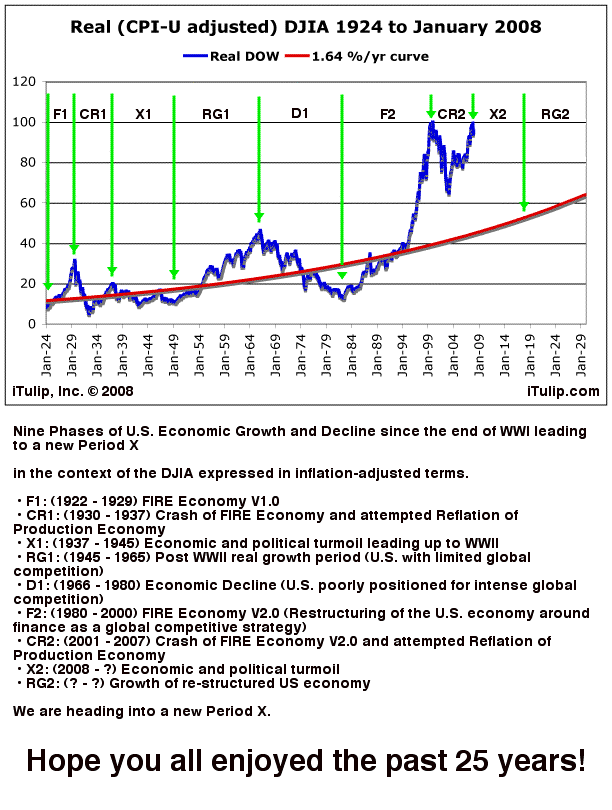Re: Stocks up, gold down - time for a change in thesis?
Stockman - I've been waiting for months for someone to make that mention in the middle of this bear market. This bears noting - we are in a global meltdown, and at it's center are the stock markets - not just the US, but the world - everyone looking increasingly urgently around for a tool to arrest this trend. Well, there is one tool available to the owner of the senior currency which can act as a powerful fulcrum for sparking a "recovery" - whether a fake recovery or not - and how long these stock runs last once underway may be a little bit counterintuitive also - 1970's are a good study. The "tool" available here obviously are the equity indexes.
Obviously it's a provisional tool, but stock markets are not just a discounting mechanism - as you point out, they also alter the level of economic activity in return. And they need to only loosely follow their fundamentals. Evidence for these effects is scattered everywhere.
When bystanders who put all their trust for actionable signals in the "fundamentals" are forced to watch a four or five year frenetic bull market engineered by trillions in sideline money which is cooked off in a controlled burn, like some kind of propellant fuel, and they do meanwhile consciously resist getting "herded back in", it can be a demoralizing experience. You wind up being both right and wrong at the same time and sometimes for years. Meanwhile whoever suggests market prices are ever entirely rational is dreaming. That's why I don't much like owning stocks even in the good times.
I figure you are the first person here to even mention this point - a lot of others viewing this think of it more as being more a matter "lousy fundamentals". Not to belittle fundamentals here, but I figure waiting for "fundamentals" to arrive in stock investing, half the time will put you out of synch with market turns anyway. Come to think of it, I don't even like stock investing, but I am interested by the unanimity showing up on this poll, that a bull market idea is dead as far out as the eye can see.
Your comment below is correct IMO, and astute.
Stockman - I've been waiting for months for someone to make that mention in the middle of this bear market. This bears noting - we are in a global meltdown, and at it's center are the stock markets - not just the US, but the world - everyone looking increasingly urgently around for a tool to arrest this trend. Well, there is one tool available to the owner of the senior currency which can act as a powerful fulcrum for sparking a "recovery" - whether a fake recovery or not - and how long these stock runs last once underway may be a little bit counterintuitive also - 1970's are a good study. The "tool" available here obviously are the equity indexes.
Obviously it's a provisional tool, but stock markets are not just a discounting mechanism - as you point out, they also alter the level of economic activity in return. And they need to only loosely follow their fundamentals. Evidence for these effects is scattered everywhere.
When bystanders who put all their trust for actionable signals in the "fundamentals" are forced to watch a four or five year frenetic bull market engineered by trillions in sideline money which is cooked off in a controlled burn, like some kind of propellant fuel, and they do meanwhile consciously resist getting "herded back in", it can be a demoralizing experience. You wind up being both right and wrong at the same time and sometimes for years. Meanwhile whoever suggests market prices are ever entirely rational is dreaming. That's why I don't much like owning stocks even in the good times.
I figure you are the first person here to even mention this point - a lot of others viewing this think of it more as being more a matter "lousy fundamentals". Not to belittle fundamentals here, but I figure waiting for "fundamentals" to arrive in stock investing, half the time will put you out of synch with market turns anyway. Come to think of it, I don't even like stock investing, but I am interested by the unanimity showing up on this poll, that a bull market idea is dead as far out as the eye can see.
Your comment below is correct IMO, and astute.
Originally posted by stockman
View Post


Comment